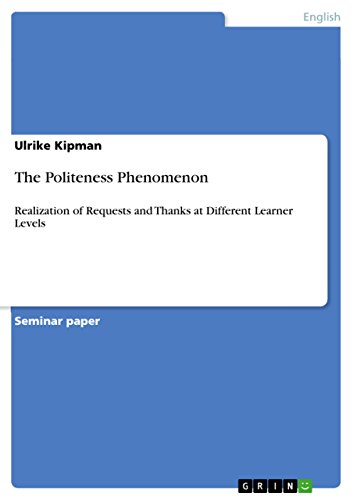The Politeness Phenomenon: Realization of Requests and Thanks at Different Learner Levels - Softcover

Zu dieser ISBN ist aktuell kein Angebot verfügbar.
Alle Exemplare der Ausgabe mit dieser ISBN anzeigen:„Über diesen Titel“ kann sich auf eine andere Ausgabe dieses Titels beziehen.
- VerlagGRIN Publishing
- Erscheinungsdatum2010
- ISBN 10 3640698835
- ISBN 13 9783640698837
- EinbandTapa blanda
- Auflage3
- Anzahl der Seiten28
Neu kaufen
Mehr zu diesem Angebot erfahren
Versand:
EUR 32,99
Von Deutschland nach USA
Beste Suchergebnisse beim ZVAB
The Politeness Phenomenon : Realization of Requests and Thanks at Different Learner Levels
Buchbeschreibung Taschenbuch. Zustand: Neu. Druck auf Anfrage Neuware - Printed after ordering - Seminar paper from the year 2009 in the subject English Language and Literature Studies - Linguistics, grade: 2, University of Salzburg (Anglistik), language: English, abstract: The term 'politeness' goes back to the sixteenth century (e.g. Burke 1993) and is described as 'having or showing that one has good manners and consideration for other people' in the Oxford Advanced Learners Dictionary. However, since it is associated to the terms 'civility' and 'courtesy', there are several connections to civilization and life-experience (see for example the Dutch translation 'be-leefd-heid'). Therefore 'politeness' is not an absolute term, but influenced by social hirarchy and social status. For about 30 years by now politeness is a very popular research topic and the term has received many different definitions and interpretations (Eelen, 2001). I therefore want to start by summarizing and discussing the most important approaches to linguistic politeness.One of the most interesting aspects of this research field is its situation in the intersection of language and social reality. To study linguistic politeness may lead to a deeper understanding of the connections between society, ethics and language. In the linguistic perspective politeness is a form of language use, which is therefore invariably coupled with social roles and relationships.Not only the social state in a given speech community, but also the language itself influences the expression of politeness, since speech communities differ in their notion of politeness. In second language acquisition not only vocabulary and grammar rules have to be learnt, but also the set of social norms of the foreign speech community. It is therefore of great interest, how second language learners show politeness at different learner levels. I will present an empirical study on the expression of Request and Thanks in Austrian students of different English competence level compared to a native speaking control group. Artikel-Nr. 9783640698837
Weitere Informationen zu diesem Verkäufer | Verkäufer kontaktieren

